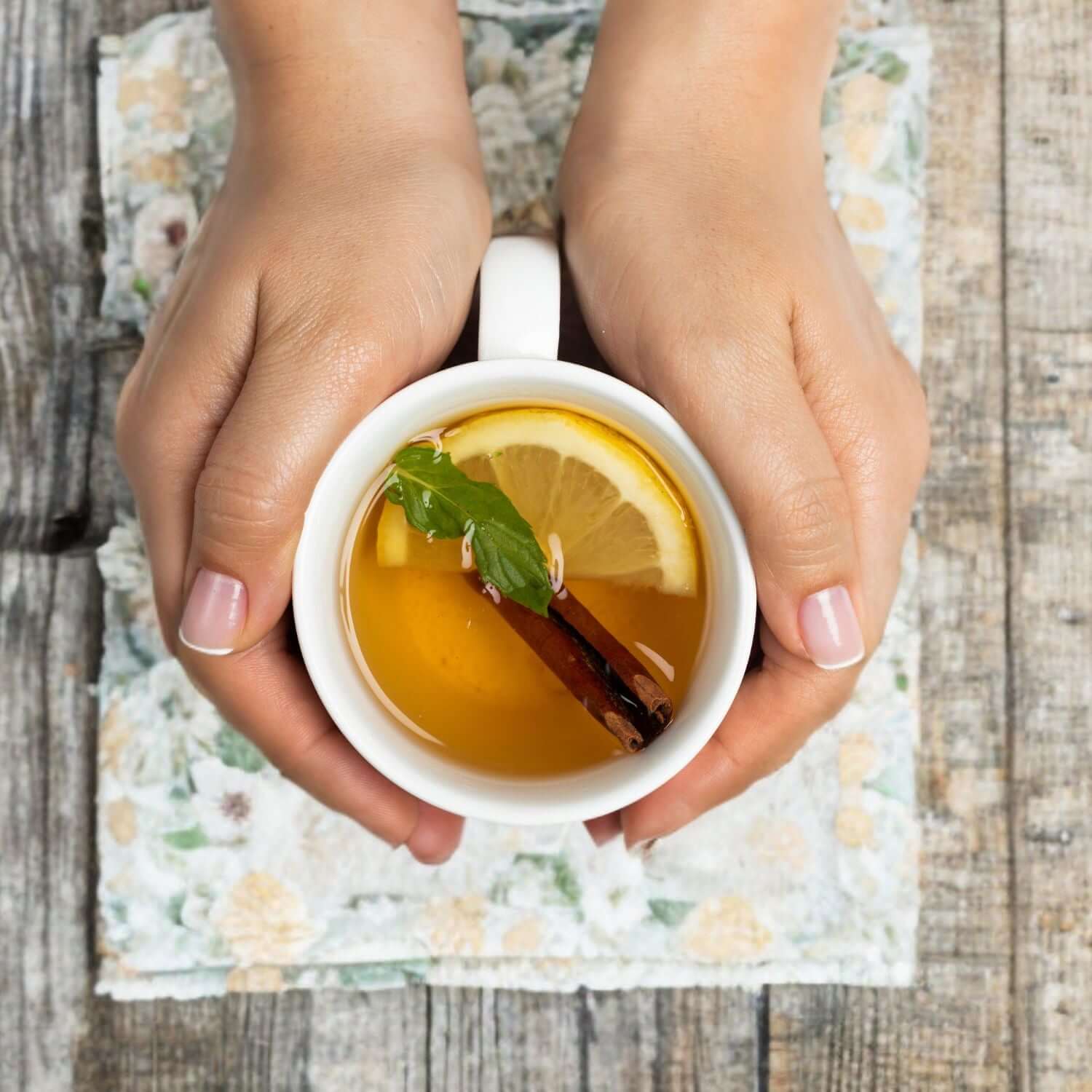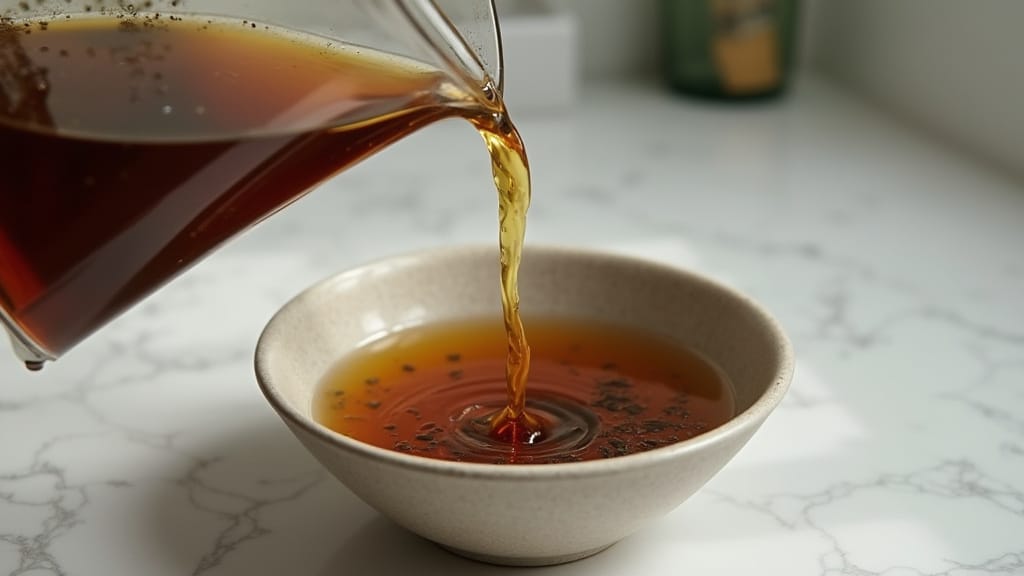Unlocking the Secrets of Raspberry Leaf Tea
Welcome to a delightful exploration into the heart of herbal wellness with Sacred Plant Co's Raspberry Leaf Tea. This ancient brew, revered for generations for its subtle charm and myriad health benefits, holds a special place in the realm of herbal remedies. Raspberry leaf tea, deeply rooted in traditional medicine, offers a unique harmony of flavor and health, making it a sought-after choice for those embracing natural wellness.

Its popularity is not just as a comforting beverage; raspberry leaf tea is also celebrated for its significant role in various stages of life, particularly in women's health. Today, this herbal jewel is experiencing a resurgence, finding its way into the cups of health enthusiasts and herbal tea aficionados alike. Our blog on the historical uses and benefits of raspberry leaf tea dives deeper into its rich legacy.
In this article, we're excited to share with you the art of creating the perfect cup of raspberry leaf tea using Sacred Plant Co's premium leaves. We'll guide you through a simple, elegant process to bring this traditional tonic to life. Whether you're a seasoned herbal tea drinker or a newcomer, this raspberry leaf tea recipe promises a delightful sensory experience.
Embark on this flavorful journey with us and discover the transformative power of a humble leaf. And don't miss exploring how this herbal treasure supports postpartum wellness in another insightful read.
The History and Heritage of Raspberry Leaf Tea
The story of raspberry leaf tea is steeped in a rich tapestry of cultural heritage and traditional medicine. For centuries, various cultures across the globe have turned to the leaves of the raspberry plant, not merely for their pleasant taste, but for their remarkable health benefits. This venerable herbal remedy, made from the leaves of the Rubus idaeus plant, has been a cornerstone in the annals of herbal medicine.

In Europe, raspberry leaf tea has been a long-standing herbal ally, particularly among women. It was traditionally used to aid in various stages of women’s health, from menstrual support to easing childbirth and aiding postpartum recovery. These traditional uses underscore the tea’s historical significance as a women’s tonic, a theme explored in our blog about the historical uses of medicinal herbs.
Native American cultures also recognized the value of raspberry leaves, using them in various herbal remedies. The leaves were not only consumed as tea but were also incorporated into other medicinal preparations for their soothing and strengthening properties.
The journey of raspberry leaf tea from a local herbal remedy to a globally recognized tonic is a testament to its enduring appeal and effectiveness. Today, it continues to be celebrated for its health benefits, a topic we delve into in our blog on raspberry leaf tea's benefits and recipe.
The enduring legacy of raspberry leaf tea, from ancient herbalists to modern-day wellness enthusiasts, speaks to its time-tested benefits and its special place in the world of natural remedies. As we continue to explore and appreciate the natural world's gifts, raspberry leaf tea remains a symbol of nature's gentle yet powerful support for human health.
Understanding Raspberry Leaves
The unassuming raspberry plant, scientifically known as Rubus idaeus, is not just famous for its delicious fruit but also for the medicinal virtues of its leaves. Raspberry leaves have been a hidden gem in the world of herbal remedies, offering a wealth of health benefits that have been acknowledged for centuries.
Botanical Profile Raspberry leaves come from the same plant that gives us the beloved raspberry fruit. However, it's the leaves that hold a special place in herbal medicine. They are typically harvested in the spring or early summer, when their nutrient content is at its peak. The leaves are then dried and can be used to make tea. Sacred Plant Co offers an excellent selection of these organic raspberry leaves, perfect for a high-quality brew.
Nutritional and Medicinal Properties Raspberry leaves are rich in vitamins and minerals, including vitamin C, vitamin E, calcium, iron, and magnesium. They also contain flavonoids, tannins, and ellagic acid, compounds known for their antioxidant properties. These components contribute to the leaves’ health-promoting qualities, including anti-inflammatory and immune-boosting effects.
Historical and Modern Use Historically, raspberry leaves have been used in traditional medicine for a variety of purposes. They have been known to aid in digestive issues, support menstrual health, and during pregnancy, to help prepare the uterus for childbirth. In modern herbalism, these uses have been embraced and expanded upon, with many people turning to raspberry leaf tea as a gentle yet effective remedy for various health concerns.
Raspberry leaves' multifaceted benefits and their gentle nature make them a staple in the herbal medicine cabinet. Whether used for specific health reasons or simply enjoyed as a nourishing tea, these leaves offer a connection to the healing power of nature, a theme further explored in our detailed blog post on raspberry leaf tea.
Health Benefits of Raspberry Leaf Tea
Raspberry leaf tea, a staple in herbal medicine cabinets, is renowned for its myriad

health benefits. This gentle yet potent tea has been a go-to remedy for various health concerns, particularly in women's health. Let's explore the diverse benefits this herbal tea offers.
Menstrual Health One of the most notable benefits of raspberry leaf tea is its role in supporting menstrual health. Women have used it for centuries to alleviate menstrual discomfort. The tea is believed to help tone the pelvic muscles and uterine lining, potentially easing cramps and regulating menstrual flow. A study published in the Journal of Ethnopharmacology suggests that raspberry leaf could have muscle relaxant properties, which may contribute to its effectiveness in alleviating menstrual cramps.
Digestive System Support Raspberry leaf tea is also known for its positive effects on the digestive system. The tannins present in the leaves can aid in soothing stomach aches and alleviating symptoms of diarrhea. Its anti-inflammatory properties may also help reduce inflammation in the gut, contributing to overall digestive health.
Pregnancy and Postpartum Benefits Perhaps the most famed use of raspberry leaf tea is during pregnancy and postpartum. Traditionally, it has been used to strengthen and tone the uterine muscles, preparing the womb for childbirth. Some midwives and herbalists recommend it for its potential to ease labor and delivery. However, it's important to note that pregnant women should consult their healthcare provider before consuming raspberry leaf tea. Postpartum, the tea can continue to offer support by aiding in uterine recovery and potentially assisting with milk production for breastfeeding mothers.
Nutritional Boost In addition to these specific benefits, raspberry leaf tea is a nutritional powerhouse. It's rich in vitamins and minerals, including magnesium, potassium, iron, and B vitamins, which contribute to overall health and vitality.
Expert Opinions and Research Experts in herbal medicine often recommend raspberry leaf tea for its health benefits, citing its nutrient-rich composition and traditional uses. While more research is needed to fully understand and validate all of its potential benefits, numerous anecdotal reports and historical usage provide a strong foundation for its continued use in herbal practices.
In summary, raspberry leaf tea offers a range of health benefits, making it a valuable addition to a holistic wellness routine. Whether used for menstrual relief, digestive health, or support during pregnancy and postpartum, it stands as a testament to the power of natural remedies.
Sourcing Your Ingredients
When it comes to making the perfect cup of raspberry leaf tea, the quality of your ingredients is paramount. Here are some tips on how to source the best raspberry leaves and why choosing organic and sustainably sourced leaves matters.
Where to Find High-Quality Raspberry Leaves
- Health Stores: Many health and wellness stores stock raspberry leaves. These are often available in loose-leaf form or as part of herbal tea blends.
- Online Retailers: For convenience and a wider selection, online retailers are a great option. You can find a variety of raspberry leaf products, often with detailed information about their sourcing and processing methods.
- Sacred Plant Co: For those looking for a trusted source, Sacred Plant Co offers high-quality, raspberry leaves. Our raspberry leaves are carefully selected to ensure the highest quality and are perfect for crafting a nutritious and flavorful tea.
The Importance of Sustainable Sourcing
- Sustainable Practices: Sustainable sourcing is crucial for preserving the environment and ensuring the long-term availability of raspberry leaves. By choosing suppliers who prioritize sustainable practices, like Sacred Plant Co, you're supporting ethical agriculture and responsible stewardship of natural resources.
Raspberry Leaf Tea Recipe
Brewing a cup of raspberry leaf tea is simple and rewarding. Here's a step-by-step guide to making both hot and cold versions of this herbal tea, with suggestions for variations to suit your taste. For a detailed recipe, check out the Perfect Raspberry Leaf Tea Recipe on Sacred Plant Co’s blog.
Hot Raspberry Leaf Tea:
Ingredients:
1-2 teaspoons of dried Sacred Plant Co Raspberry Leaves
1 cup of boiling water
Optional: honey, lemon, or your choice of sweetener
Instructions:
Place the raspberry leaves in a tea infuser or directly in a cup.
Pour boiling water over the leaves.
Let the tea steep for about 10-15 minutes. This allows the full flavor and nutrients to be released.
Remove the leaves and add sweetener or lemon if desired.
Enjoy your warm, soothing cup of raspberry leaf tea!
Cold Raspberry Leaf Tea Recipe (Iced Raspberry Tea):
2 tablespoons of dried Sacred Plant Co Raspberry Leaves
1 quart of boiling water
Optional: slices of lemon, lime, cucumber, or mint leaves for garnishing
Instructions:
Place the raspberry leaves in a large jar or pitcher.
Add boiling water and let it steep for about 30-45 minutes.
Strain out the leaves.
Refrigerate the tea until it's cool.
Serve over ice with optional garnishes for a refreshing herbal drink.
Variations:
- Herbal Blends: Consider adding other herbs like peppermint, chamomile, or lemon balm to create your own blend.
- Sweetener Options: If you prefer a sweeter tea, add honey, agave syrup, or stevia according to your taste.
Whether you prefer your tea warm or cold, these raspberry leaf tea recipes are a delightful way to enjoy the benefits of this herbal remedy. Feel free to adjust the recipes to suit your personal taste and explore different variations for a unique tea experience.
Customizing Your Tea Experience
Raspberry leaf tea is not only beneficial for your health; it's also a versatile beverage that can be tailored to suit your personal tastes and preferences. Here are some suggestions to enhance your tea-drinking experience, making each cup a delightful journey of flavors.
Time of Day Pairings
- Morning Boost: Start your day with a warm cup of raspberry leaf tea. Its subtle, natural energy can be a gentler alternative to coffee.
- Afternoon Relaxation: Enjoy a cup in the afternoon, perhaps with a slice of lemon, to provide a calming break in your day.
- Evening Wind-Down: Sip on raspberry leaf tea in the evening to unwind. Its lack of caffeine makes it a perfect choice for relaxation before bedtime.
Food Pairings
- Breakfast: Pair your morning tea with a light breakfast such as yogurt and granola or toast with jam.
- Lunch: Accompany a fresh salad or a sandwich with a refreshing glass of iced raspberry leaf tea.
- Dinner: Complement your evening meal with a hot cup of tea, particularly good with vegetarian dishes or a hearty stew.
Personalizing Flavors
- Sweeten It Up: If you prefer a sweeter taste, add honey, agave syrup, or stevia. These natural sweeteners can enhance the flavor without overpowering the tea's natural essence.
- Citrus Twist: Add a slice of lemon, lime, or orange to your tea for a zesty twist. Citrus can brighten up the flavor, making it more refreshing, especially when served cold.
- Herbal Infusions: Mix in other herbs like peppermint, chamomile, or ginger to create a blend that caters to your taste and mood. Each herb brings its own health benefits and flavor profile to the tea.
- Spice It Up: For a warming sensation, especially during colder months, consider adding a cinnamon stick or a few cloves while steeping the tea.
By experimenting with these suggestions, you can transform your raspberry leaf tea into a personalized beverage that perfectly suits your palate and complements your daily routine. Whether you're enjoying a quiet moment alone or sharing a pot with friends, raspberry leaf tea offers a versatile and enjoyable experience for every tea lover.
Precautions and Best Practices
While raspberry leaf tea is a natural and generally safe herbal remedy, it's important to be mindful of certain precautions and best practices, especially for specific groups such as pregnant women and individuals with certain health conditions.
Potential Side Effects
- General Precautions: Raspberry leaf tea is typically well-tolerated, but like any herbal product, it can cause side effects in some individuals. These may include mild nausea, digestive discomfort, or allergic reactions in rare cases. If you experience any adverse effects, it's advisable to discontinue use and consult a healthcare professional.
Pregnancy and Raspberry Leaf Tea
- Consult Your Healthcare Provider: While raspberry leaf tea is often recommended for its potential benefits during pregnancy, particularly in the third trimester, it's crucial to consult with your healthcare provider before adding it to your regimen. They can provide personalized advice based on your individual health history and pregnancy.
- Timing and Moderation: If given the green light by your doctor or midwife, it's generally advised to start with a lower amount and gradually increase the intake as you approach your due date. Moderation is key – overconsumption should be avoided.
Individuals with Specific Health Conditions
- Medical Conditions: If you have a personal history of hormone-sensitive conditions, such as certain types of breast cancer, uterine fibroids, or endometriosis, seek advice from your healthcare provider before consuming raspberry leaf tea, as it may affect hormone levels.
- Medication Interactions: Raspberry leaf tea might interact with certain medications, including blood thinners and diabetes medication. If you're on any prescription drugs, it's wise to talk to your doctor before starting any new herbal remedy.
General Best Practices
- Moderation: As with any supplement or herbal remedy, moderation is essential. Stick to recommended amounts and listen to your body's response.
- Quality Matters: Ensure you're using high-quality raspberry leaf tea, like the one offered by Sacred Plant Co. High-quality products are more likely to be free of contaminants and more effective.
By adhering to these precautions and best practices, you can safely enjoy the benefits of raspberry leaf tea while minimizing any potential risks. Remember, consulting with a healthcare provider is always the best course of action when adding any new element to your health regimen.
Conclusion
In this exploration of raspberry leaf tea, we've journeyed through the rich heritage and myriad health benefits of this revered herbal remedy. From its historical roots as a women's tonic to its modern-day resurgence in natural wellness circles, raspberry leaf tea stands out as a gentle yet potent aid for various health concerns.
We've delved into the nutritional wealth of raspberry leaves, highlighting their role in supporting menstrual health, aiding digestive function, and providing potential benefits during pregnancy and postpartum. Sourcing high-quality, organic leaves, like those from Sacred Plant Co, ensures you're getting the best in terms of purity and efficacy.
Our step-by-step guide to brewing raspberry leaf tea, whether you prefer it hot or iced, invites you to create a personalized tea experience. We've offered suggestions to tailor your tea to your taste, making each cup a unique and enjoyable moment.
However, it's important to approach raspberry leaf tea with mindfulness, especially for pregnant women and individuals with certain health conditions. Consulting with a healthcare provider and adhering to best practices in moderation and quality can enhance the benefits and safety of this herbal tea.
We encourage you to try the recipe for yourself and explore the delightful and healthful qualities of raspberry leaf tea. Whether you're seeking a natural remedy for specific health issues or simply looking for a nourishing addition to your wellness routine, raspberry leaf tea offers a world of benefits waiting to be discovered.
Thank you for joining us on this herbal journey. May your cup of raspberry leaf tea bring you both health and pleasure.





